Referenda must receive a majority of votes and meet 15 per cent quorum to pass
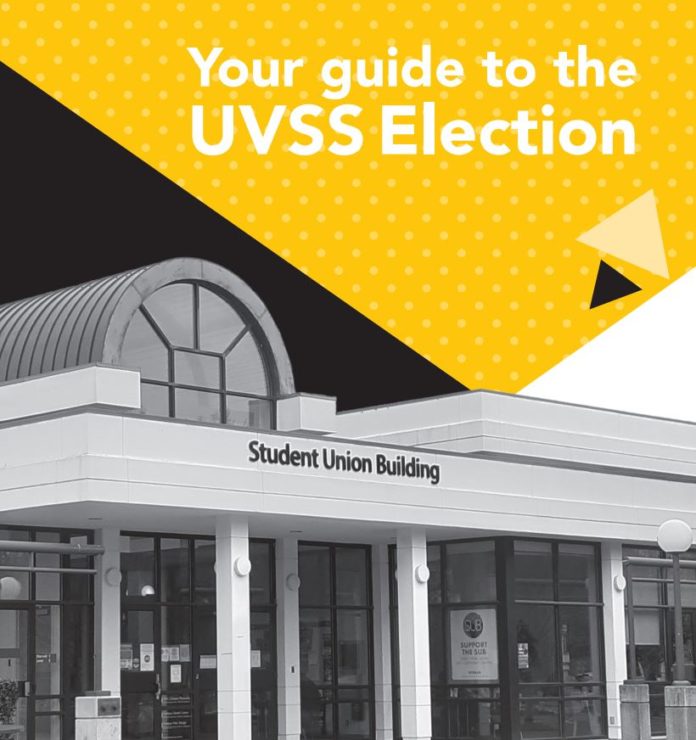
From March 24 to 26, UVic undergraduate students will be able to vote on five UVSS referendum questions. The questions ask students whether they support eliminating the public interest research group (PIRG) fee, dividing the current PIRG trust between a bursary and the UVSS operating fund, creating a fee for open educational resources (OERs), creating a fee for sustainability improvements to the Student’s Union Building, and tying UVSS fees to inflation.
The UVSS relies on referenda to make any changes to their fee structure. To pass, each question must be approved by a majority of voters and receive at least 15 per cent voter turnout. Three of the questions on this year’s ballot — regarding PIRG and OERs — have failed before by not meeting this 15 per cent quorum. In the fall, the voter turnout was a meger 5.9 per cent.
Related: UVSS elections: Meet the candidates vying for lead director positions
This year’s referendum questions ask students if they want to get rid and add some small fees. Together, student fees for full-time students would increase by inflation every year and by 1$ if all of these referendums pass.
PIRG fee and trust
The first two referendum questions on this year’s ballot relate to the $3 PIRG fee. With no such group currently in the SUB, the UVSS is moving to eliminate the fee.
The fee was created in 1983 for public interest research on campus. In 2019, Vancouver Island Public Interest Research Group (VIPIRG) terminated their relationship with the UVSS after the UVSS brought forward a referendum on their funding. VIPIRG also alleged that the UVSS was too involved in the organization’s projects and affairs.
When VIPIRG terminated their relationship, the UVSS continued to collect the PIRG fee with the hope of finding a new PIRG to fill the space. In 2020, the UVSS tried to pass a referendum on the PIRG fee to end it but was unsuccessful. The UVSS has been collecting the PIRG fee each semester since with nowhere to spend it, leaving $192 623 sitting in a UVSS trust account.
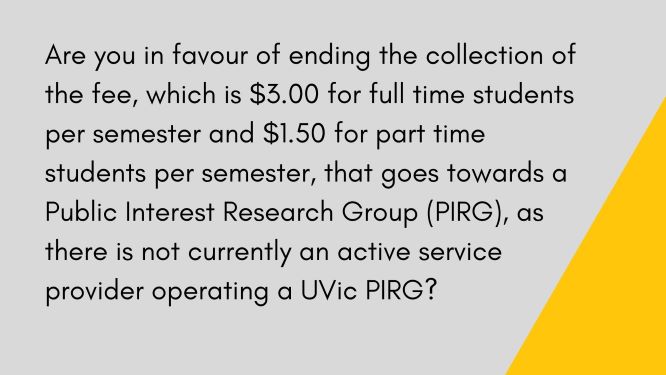
The first referendum question asks students if they are in favour of ending the fee’s collection. The second asks whether that $192 623 currently being held in trust can be split evenly between the UVSS operating fund and a UVic bursary, with preference given to BIPOC students.
UVSS Director of Finance Caleb Burd, the proponent of these referenda, says that this course of action is being taken after an unsuccessful attempt by last year’s board to incorporate a new PIRG. One prospective group gave a presentation to the board but was deemed unsuitable due to the group’s desire for autonomy.
“We did try and it didn’t work out,” said Burd. “So we do think that the best approach would be to ask students whether they support ending this fee and go from there.”
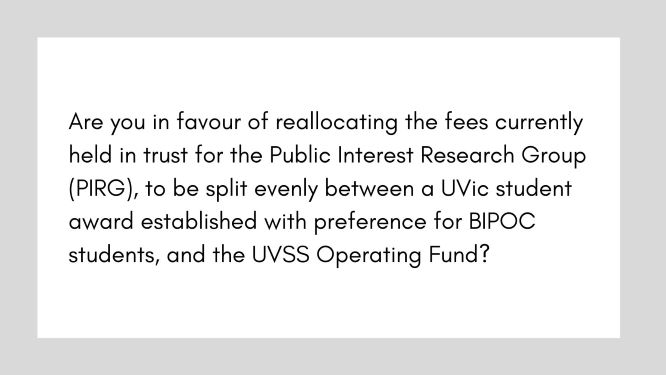
The board previously tried to pass these referenda in the fall but did not meet quorum. Burd says if the referenda do not meet quorum or receive a majority of votes the board will seek a legal opinion on whether there are other ways to carry out their plan for distributing the funds and ending the fee.
“These funds are really not supposed to sit there and not be used,” said Burd. “We want to make sure that students are getting value for the fees that they’re paying.”
Open educational resources fee
The question on open educational resources (OERs) may look familiar — this question is making its third appearance on UVSS election ballots. Jonathan Granirer, the referendum’s proponent and a former UVSS director, claimed that he had nothing new to say about the specifics of OERs and asked that the Martlet use our coverage from the last two failed referendum attempts.
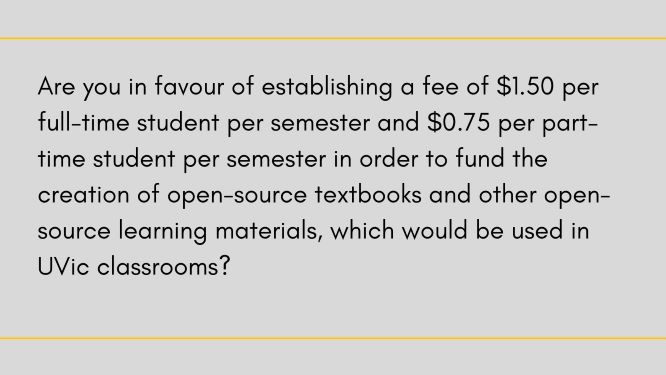
So, to echo our previous coverage: the referendum question proposes introducing a fee of $1.50 for full-time students and $0.75 for part-time students to fund the creation of open-source textbooks.
Despite Granirer’s claim that there is an outpouring of student support for this issue, both times the OER referendum question has been proposed the vote has failed to meet quorum.
Granirer said he has no new methods of increasing student engagement and told the Martlet, “I really don’t think there’s a wheel to reinvent here.” Granirer will continue to give classroom talks and promote on social media with the support of others on the UVSS board.
“OERs are really an untapped resource for students in our struggle for access to higher education because of their ability to reduce costs.”
Granirer hopes that this question will be present in future spring elections referenda if it fails again.
Tying UVSS fees to inflation
Disclaimer: this referendum question involves typing UVSS fees to inflation, including the Martlet’s fee levy.
The fourth referendum question aims to tie the UVSS student fee levy to inflation, effective September 2022. Fees are currently $76.85 for full-time students and $38.39 for part-time students each semester. While tuition rates can be raised by up to two per cent each year, student fees remain static and are changed mostly through a complicated patchwork of referenda.
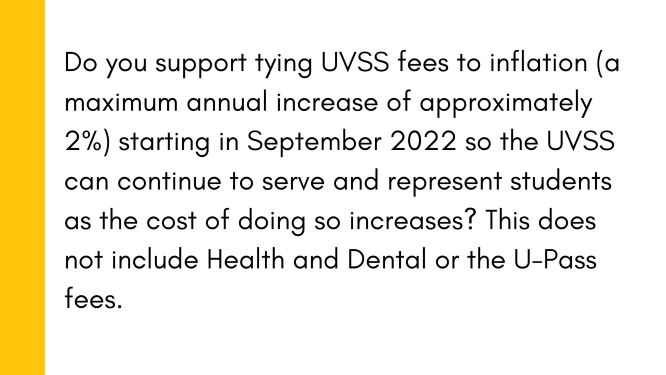
“We wanted to give students that breathing room with the pandemic and ensure that it is enacted when it’s needed,” said Emily Lowan, the current director of campaigns and community relations and the referendum’s proponent.
In a follow-up email, Lowan clarified that while inflation isn’t defined in the referendum question, the board is looking into drafting supporting policy to tie the fee increase to consumer price index (CPI) values. CPI generally increases by around two per cent per year.
If passed, this referendum would affect all services, organizations, and societies that collect a student fee levy through the UVSS. Lowan says students responded strongly in favour of a potential referendum in a recent UVSS survey.
“This referendum question was proposed because it’s been on [the UVSS board’s] to-do list for a number of years now and we wanted to give students the option to vote in favour or against,” said Lowan. “It ensures the critical student services will be able to provide that same level of support to students as the cost of doing so increases,” said Lowan.
Sustainability fee
The UVSS has plans in place to make the SUB more sustainable — but to put those plans in motion they say they need more money. The final referendum question proposes creating a semesterly fee of $2.50 per full-time student and $1.25 per part-time student to fund sustainability initiatives. The fee levy would be temporary, running from September 2021 to August 2026.
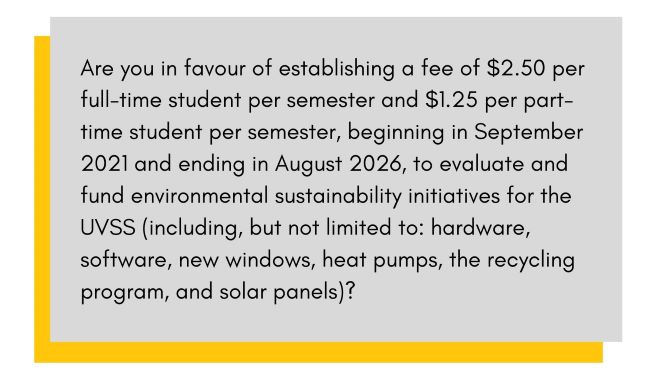
Referendum proponent and UVSS Director of Finance and Operations Caleb Burd said the new fund would allow the UVSS to invest in much-needed improvements for the SUB. He offers the example of the vestibules which, if upgraded, would allow the building to keep more heat in and in turn emit less carbon.
Burd also indicated that it would be up to future board members to decide what exactly this fund will be spent on. Although this board has prepared a report, future boards could use the funds for different projects as long as they are “environmental sustainability initiatives.”
Over the campaign period, Burd is looking forward to doing lots of classroom talks. If the referendum does not pass, he says the UVSS could still move forward with some of the planned sustainability upgrades but that it would lengthen the timeline.
UVic undergraduate students can vote in UVSS elections for lead directors and on the referendum questions between 9 a.m. on March 24 and 12 p.m. on March 26 at webvote.uvic.ca. All of the directors-at-large were acclaimed.







